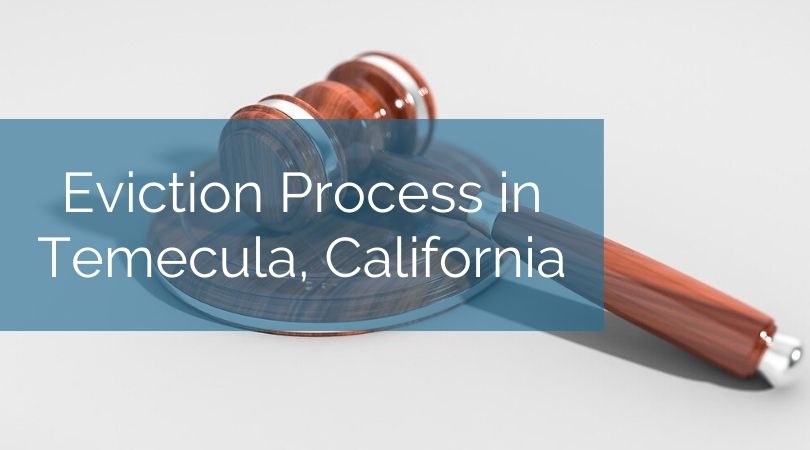What is the Eviction Process in California?
The Superior Court of California administers all eviction processes in the state. A trial provides both you as the landlord and your resident with the chance to make a statement and present your evidence. If the resident loses the case, their credit report will carry the judgment for seven (7) years.
Notice for Lease Termination with Legal Cause
As a California landlord, you can evict a resident for a variety of reasons. These reasons include:
- They did not honor their responsibility to pay their rent.
- The resident violated the leasing agreement.
- They performed illegal actions on the property or using it for an illegal purpose.
In Temecula, it’s easy to remember the Eviction notice period no matter the reason for the termination. Generally, it’s a 3-day notice period generally for all three types of eviction notices:
- You can give a 3-Day Notice to Pay Rent to a resident who’s unable to pay their rent on the due date. If they are still unable to pay after 3 days, you can file a Summons and Complaint about Unlawful Detainer.
- You can give your resident a 3-Day Notice to Cure if they have violated the leasing agreement. If they have not fixed the issue after 3 days, filing a Summons and Complaint about Unlawful Detainer will be your next step.

- You should hand a 3-Day Unconditional Quit Notice to a resident who has committed a grave violation of the leasing agreement. This may refer to a resident committing illegal activities on the property, performing extreme damage in the property, and/or breaching the policy of subletting the property without notifying you. If the resident has not moved out after 3 days, you would then file a Summons and Complaint about Unlawful Detainer.
The California Eviction Process Timeline Regarding Notices
The amount of notice you need to provide to terminate a lease without cause in Temecula depends on the type of tenancy period.
- A 30-day Eviction Notice must be given to a month-to-month lease resident who has been renting the property for a year or less.
- A 60-day Eviction Notice must be given to a month-to-month lease resident who has been renting the property for more than a year.
Note that for a fixed-term tenancy, you are not allowed to terminate the lease without legal cause. Therefore you do not need to provide a notice, as it’s understood that the lease will end at a specific date. This is subject to the leasing terms and applicable renewal policies.
Resident Defenses
The defense is the resident’s proposed reason for why you shouldn’t win the case. A resident may claim:
- That you are guilty of retaliating if the resident reported unsafe or uninhabitable living conditions to a government agency.
- You turned to self-help actions by turning off utilities, altering the locks of your property or performing illegal actions that restrict the access of the resident to the rental unit.

- That you failed to maintain the rental unit so that it became uninhabitable for the resident.
Attending the Court Hearing
The resident has five (5) days to respond once a Summons and Complaint about Unlawful Detainer has been filed. If they fail to respond within 5 days, the court may award a default judgment to you.
However, if the resident responds within the prescribed period, a trial schedule will take place within twenty (20) days.
At the court hearing, it’s essential to get your hands on documents relevant to the case. Bring original documents as well as three (3) copies of each. Some of the most important documents to bring are the following:
- The signed leasing agreement.
- The notice you served to the resident.
- A written letter or received letters in reference to the rental property.
- Clear photos that display the damage done at the rental unit or other issues, if documentable.
- Clear photos that display uninhabitable or unsafe conditions of the rental unit.
- Building inspection reports.
Bringing a witness who can present first-hand knowledge will also help your case. You should have a subpoena issued so that the witness can excuse themselves from their work for the trial.

Writ of Possession – California
Once the judge releases a decision in your favor, you will be granted a Writ of Possession. Should the resident refuse to move out beyond the five (5) day extension from the date of the court judgment, the Writ shall be carried out.
Evicting a Resident
A three (3) day period is given to the local Sheriff to serve the Writ of Possession to the resident. In some cases, the resident may be provided Relief From Forfeiture by the judge. This means the resident can stay on the property. A court will only grant this in special cases when the resident can prove they are going through serious hardship. Further, the resident must prove they can pay the rent at a definite time period.
Another option available for a California resident is filing for a Stay of Eviction when they lose the court case. In 24 hours, they must file in writing and give you this request. This means the resident must pay a daily rent on each day of stay. This is only applicable if the court grants the request. Only 40 days is allowed provided the court grants it to the resident.
Conclusion
If you have specific questions, you should hire the services of a qualified California attorney. Alternatively, you can seek help from a knowledgeable property management company, such as PURE Property Management Real Estate Sales & Property Management.
Please note you should not substitute this post for legal advice from a licensed attorney in your state. Laws frequently change, and this post might need updating at the time of your reading. Please contact us for any questions you have in regards to this content or any other aspect of your property management needs.

